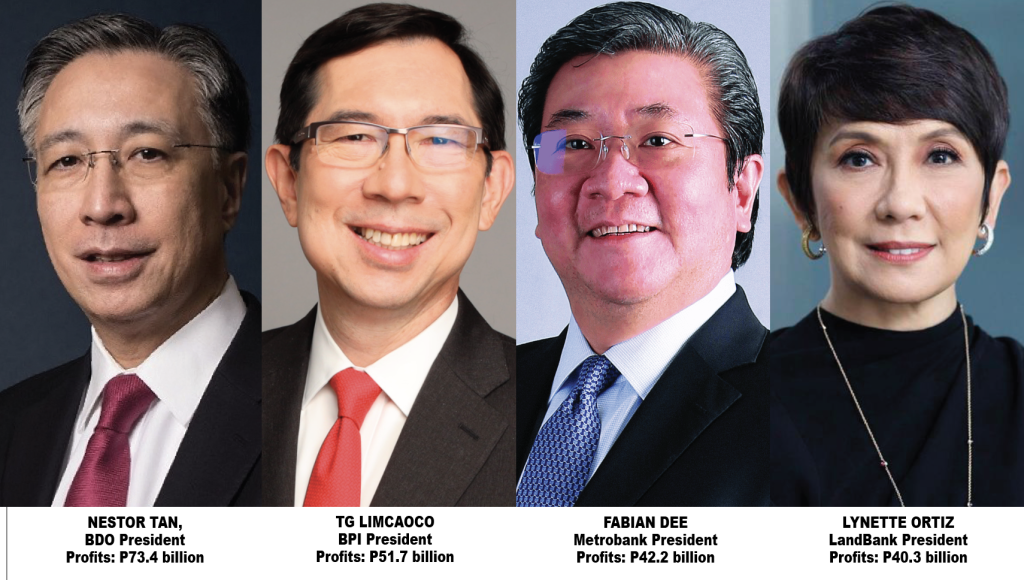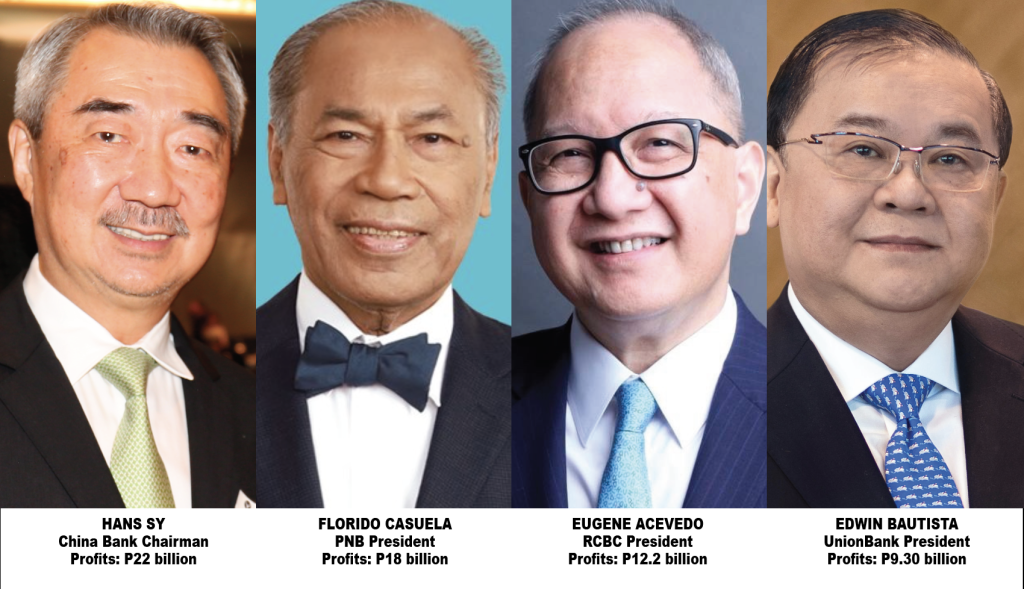By TONY LOPEZ

The best business in the Philippines today is banking. Banks are hauling profits like there was no tomorrow. By the billions per month. A number of banks reported record profits ever.
In the whole year of 2023, the Sy-family’s BDO Unibank reported whopping profits of P73.4 billion, up 28.5% from its previous record of P57.1 billion in 2022, which itself was a jump of 33% from P42.8 net in 2021.
The P73.4 billion is the largest profit ever by any bank in the Philippines. In fact, it is the largest profit ever by any private corporation in the Philippines. With Tessie Sy as chair and Wharton-educated Nestor Tan, 66, as president-CEO, BDO has been the country’s largest bank since 2015.
BDO is singlehandedly financing, up to P180 billion, the P1-trillion modernization of the Ninoy Aquino International Airport beginning this year by San Miguel Corp.. SMC needs P30 billion to pay the government upfront, plus P122 billion in capex.
Ayala-owned Bank of PI, the oldest bank in Southeast Asia, increased its profits by 30.5% to P51.7 billion, also a record high for the bank. BPI has been unusually profitable under Stanford-educated (Math, honors, 1984) President and CEO Jose Teodoro “TG” Limcaoco, the grandson of a banker.

Metrobank
Close behind is the Ty-owned Metrobank, the third-largest bank. Its net income rose 29% to P42.2 billion a record. Arthur V. Ty, 57, has been Metrobank chair, since 2012. He has an MBA from Columbia, 1991. Fabian Dee, 61, is president and CEO. He has a BS in Management Engineering, Ateneo. Metrobank has been cited many times as the Best Corporate Bank and the Strongest Bank.
Land Bank profits
The country’s second-largest bank, state-owned LandBank reported record net profits of P40.3 billion, exceeding its P35-billion profit target for 2023.
Monthly, BDO makes P6.1 billion in net profits; BPI P4.3 billion; Metrobank P3.5 billion; and LandBank P3.3 billion.
Not to be outdone are the other government financial institutions. The Government Service Insurance System (GSIS) under CEO Wick Veloso reported astonishing profits of P113.3 billion in 2023, up 70% over 2022, 36.4% of its revenues of P311 billion. La Salle-educated Wick was HSBC’s first Filipino CEO in 2012, before moving into PNB as CEO in 2018. In July 2022, he succeeded Rolly Macasaet as GSIS CEO.
The pension fund of private workers, meanwhile, the Social Security System, reported net profits of P83.13 billion, up 62.8%.
For every P100 of revenues, GSIS makes P36.4. Every month, the state pension fund carts away P9.44 billion in profits. GSIS is the Philippines’ most profitable enterprise. In that sense, GSIS is the country’s best managed company.
SSS profits
SSS delivers P6.92 billion in profits every month.
On profit performance alone, SSS, under Rolly Macasaet (UP MBA, cum laude) is the Philippines’ second best managed company.
Chinabank nets P22 billion, up 15%
Under Chairman Hans Sy and President Romeo D. Uyan Jr., China Banking Corp. saw profits soar to a record P22 billion in 2023, up 15%, on higher core business revenues.
ChinaBank’s reported a return on equity of 15.5% and a return on assets of 1.6%—still among the best in the industry.
Net interest income rose 17% to P53.5 billion as the strong growth in loans and investments offset the significantly higher interest expense. Net interest margin was maintained at 4.2%.
With the improving economic conditions, the bank reduced loan loss provisions to P1.2 billion. Asset quality was stable with a 2.5% non-performing loan (NPL) ratio while NPL coverage remained sufficient at 104%.
“Our strong growth in 2023 solidifies our position as one of the top four banks in the country,” Chinabank CEO Uyan Jr. said. “We remain focused on executing our business strategies while leveraging our investments in digitalization to deliver better services to our customers.”
Total ChinaBank assets hit P1.5 trillion, up 11%, still the 4th largest among privately-owned domestic banks.
Gross loans grew by 10% to P791 billion, with the share of consumer loans to the total loan portfolio now at 23%. On the funding side, total deposits rose 11% to P1.2 trillion with CASA ratio at 48%.
Total equity stood at P150 billion, up 12%, with capital ratios well above the regulatory minimum: 15.3% common equity tier 1 ratio and 16.1% total capital adequacy ratio. Book value per share was at P55.82, up 12%.
ChinaBank is among the best-governed publicly listed companies and best employers in the country, winning the Institute of Corporate Directors’ Five-Golden Arrow award for the second time in 2023, and the People Management Association of the Philippines’ 2023 Employer of the Year.
The bank also received international recognition as among the most innovative companies and among the best in the private banking sector: Gold Award for Product Innovation from Infosys Finacle, Big Shift Champion of the Year award from Backbase, and Outstanding Wealth Management Service for the Affluent award from Private Banker International.
RCBC profits a record
Yuchengco-owned Rizal Commercial Banking Corp. (RCBC) posted record profits of P12.22 billion in 2023.
Customer loans soared by 15% year on year, faster than the industry average. CASA deposits increased by 19%, likewise outpacing the industry’s 3% growth.
“RCBC saw another breakthrough year in our financial performance, complemented with more recognitions in digital banking and customer service, RCBC President and CEO Eugene S. Acevedo said, “We will intensify the use of Al and data science across the bank to guide our product innovation and exceptional service delivery.”
With total assets of over P1.2 trillion, RCBC solidified its position as the fifth largest private bank in the country.
Year-on-year, customer loans reached P622 billion, led by a solid 29% increase in consumer loans, primarily credit cards and housing.
RCBC saw tremendous success in data-driven acquisition campaigns, with credit cards consistently outperforming industry in both balances and billings with 48% and 45% growth, respectively.
Its housing loans business recorded its highest bookings to date, boosting the portfolio by 22% from previous year.
Total deposits reached P957 billion, spurred by the increase in CASA across all segments. The bank’s cash management and payroll solutions, alongside extensive business relationships, provided the double-digit uplift in low-cost CASA deposits.
RCBC received a total of 50 awards for 2023, including RCBC’s 4-peat for “Best Bank for Digital from AsiaMoney and “Digital Bank of the Year” from The Asset. RCBC was also recognized as “Credit Card of the Year”, “Best Cash Management Bank”, “Best SME Bank”, “Best Retail Bank”, and “Best Bank for Sustainable Development by various prestigious international award giving bodies.
PNB posts record P55-billion profits, up 55%
Philippine National Bank (PNB) recorded a consolidated net income of P18.0 billion in 2023, growing by 55% year-on-year on the back of robust net interest income and lower credit provisions.
Net core banking income, which excludes gains on sale of acquired properties, climbed a record 156% year-on-year.
This translated to an improved return on equity of 10% from the 7% posted in 2022.
“Our performance for 2023 is a testament to the Bank’s efforts in upholding our vision of being among the top banks in terms of customer growth and satisfaction as well as return on equity,” said PNB President Florido P. Casuela.
“We have made it our mission to promote financial prosperity for all Filipinos and their businesses, locally and internationally. Apart from providing financial solutions to our customers, we have made it our purpose to empower them by helping build a competitive, inclusive, and sustainable economy,” Casuela said.
Net interest margin widened to 4.2% in 2023, compared to 3.6% in the previous year, as the Bank continued its focus on the efficient deployment of funds.
PNB gross loans increased by 5% from year-ago to P642 billion by end-2023 as the Bank expanded its lending to the commercial sector and small and medium-sized entities.
Likewise, the bank continued to build up its current and savings accounts (CASA) deposits, growing by 4% year-on-year, and accounting for 83% of the bank’s total deposits as of end-2023.
The healthier performance in 2023 was augmented by lower provisions on distressed loans and other credit assets as the market continued to rebound during the year from the lingering effects of the pandemic and other adverse market conditions in recent years.
Operating expenses remained flat at P28.4 billion in 2023 due to prudent spending despite the continued business growth. As a result, cost efficiency ratio improved to 50% from last year’s 54%.
As of end-2023, PNB’s total assets stood at P1.2 trillion, increasing by 6% from the previous year’s level, buoyed by higher loans and investment portfolio. Meanwhile, the Bank’s capital at P191 billion grew by 13% year-on-year, resulting in stronger Common Equity Tier 1 Ratio and Capital Adequacy Ratio of 16.85% and 17.7%, respectively.
UnionBank FY 2023 net income at P9.2 billion
Union Bank of the Philippines’ net income reached P9.2 billion in 2023. Topline revenues posted robust growth driven by a strong consumer business, higher margins, and customer transaction fees.
UnionBank’s bottom line, however, was affected by integration costs related to the Citi consumer business acquisition, according to UB President Edwin Bautista. In 2022, UB netted P12.67 billion.
Bautista promises to make UB the most profitable bank in the coming years.
“Investments in our new businesses are yielding highly promising results. The acquired Citi consumer business has consistently surpassed expectations, while UnionDigital attained profitability throughout its first full year of operations. We are experiencing early returns on these strategic investments, with leading indicators pointing towards a sustained increase in transactions over time. This is evidenced by a growing individual depositor base, an uptick in new-to-bank credit cards, record-breaking downloads of our mobile app, and net promoter scores that surpass industry standards. Our commitment extends to completing the seamless integration of these new businesses this year. Immediately after, you will see a stronger and more profitable UnionBank,” says Bautista.
Net revenues in 2023 increased 36% to P71 billion versus the same period in 2022. Net interest margin went up to 5.5% vs. 4.8% in the prior year.
This resulted to net interest income reaching P52 billion or 34% higher year- on-year. The higher margin is attributable to the remarkable growth in consumer lending.
The bank’s consumer loans now account for 58% of total loan portfolio, which is diversified across credit cards, mortgage loans, personal/salary loans, and vehicle loans.
Non-interest income was up by 41% to P19 billion, with fee-based income higher by 54% to P10 billion.
The growth in fees was a result of the growing customer transactions such as bills payments, funds transfers, interchange, and other card-related fees.
Operating expenses were up 43% to P45 billion on account of the full-year impact of the acquired Citi consumer business and UnionDigital.
These new businesses were only included as part of the banking group in the second half of 2022. At the same time, the Bank incurred one-time costs due to the integration of the acquired Citi consumer business.
Total UnionBank assets as of end 2023 hit P1.1 trillion, a 5% increase from December 2022. Net loans and receivables grew 10% to P527 billion, while total deposits remained stable at P713 billion.
“We have surpassed our customer growth targets. Our customer base is now close to 14 million. The strategic shift towards a more predictable, recurring income model has proven successful, reflected in our above-industry net interest margins and fees as a proportion of our balance sheet size. Our overall profitability, however, was affected by front-loaded costs incurred in the integration of new businesses. In a way, we are temporarily carrying the cost of running on two systems – we are paying Citi a fee to support the business on their platform while we develop and fully transition all ex-Citi retail customers to our own system. These investments are necessary to ensure the sustainability of our consumer business growth moving forward”, said Manuel R. Lozano, UB chief financial officer.
